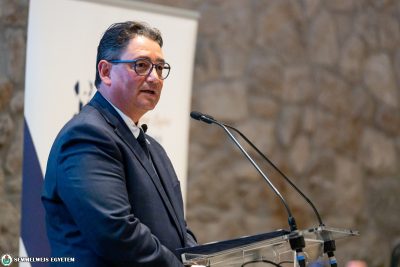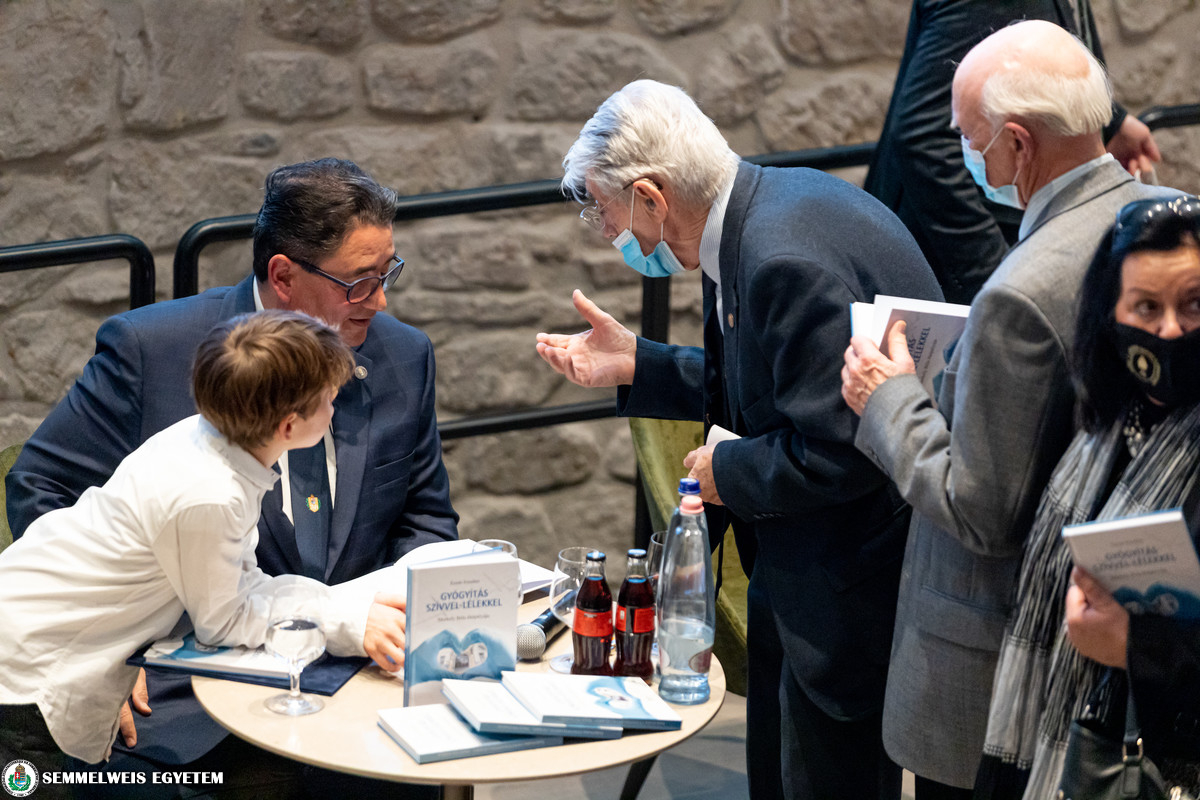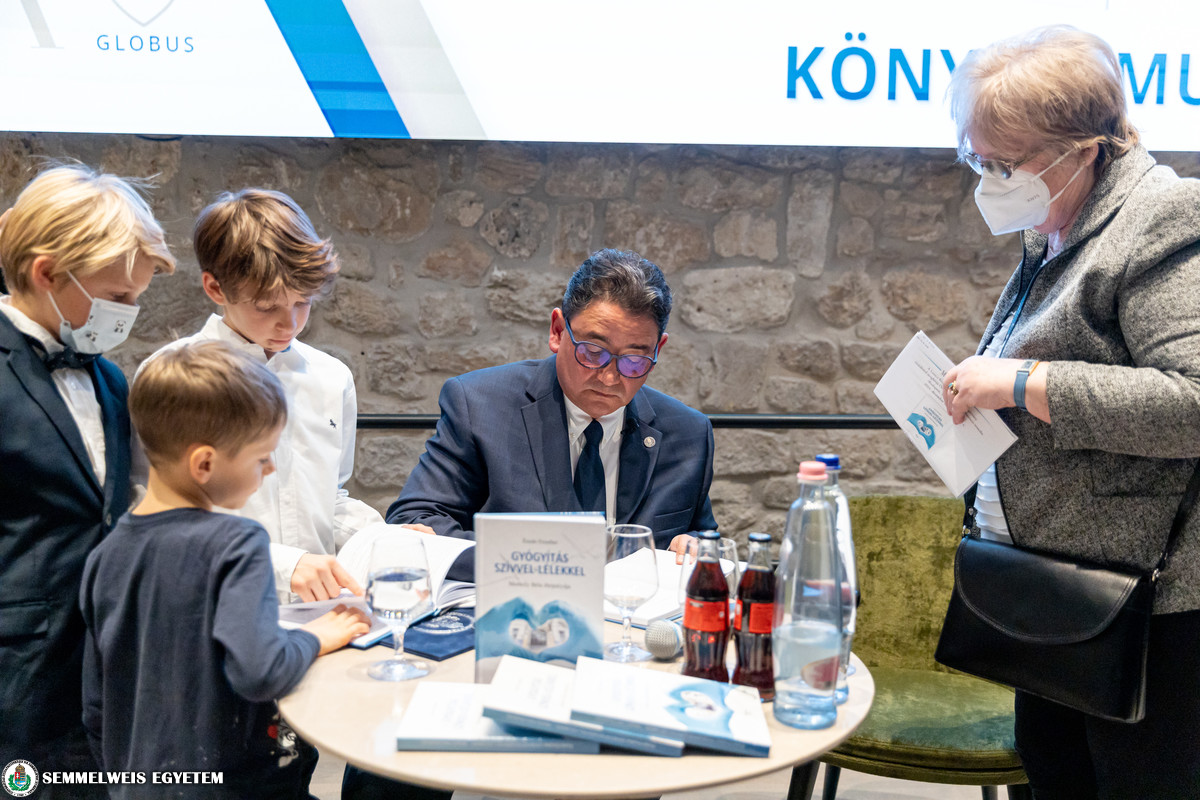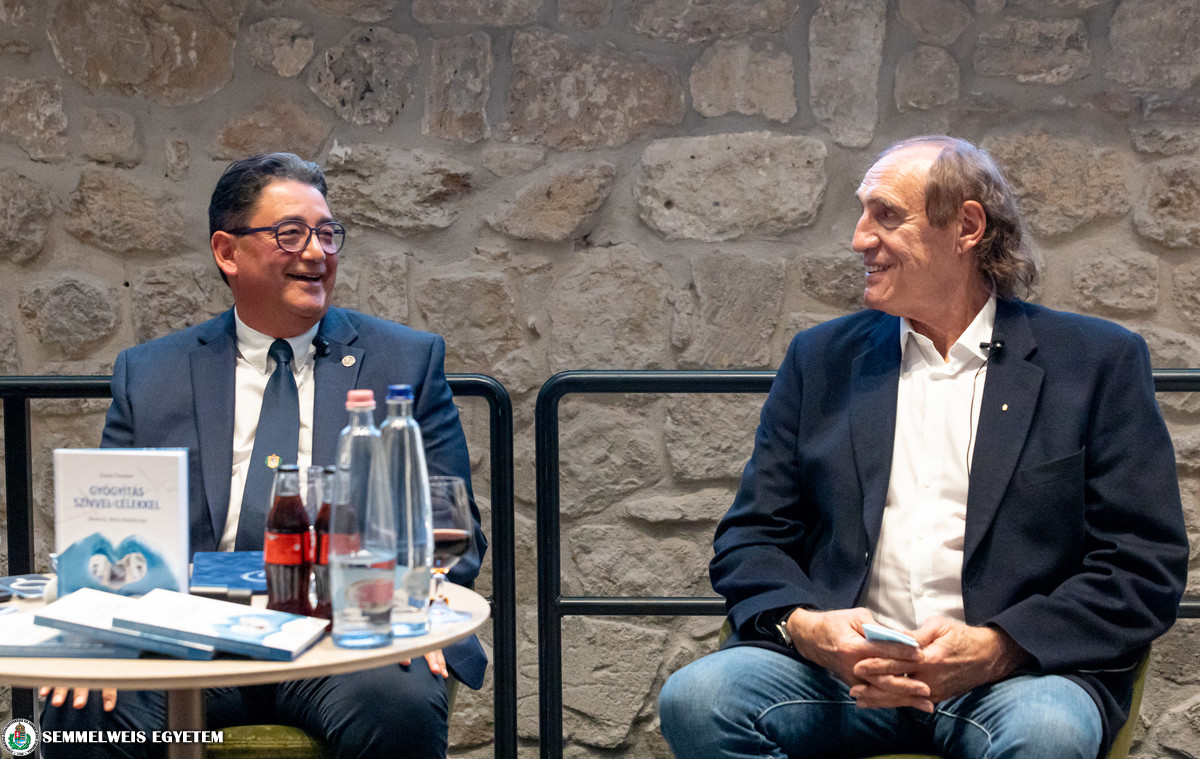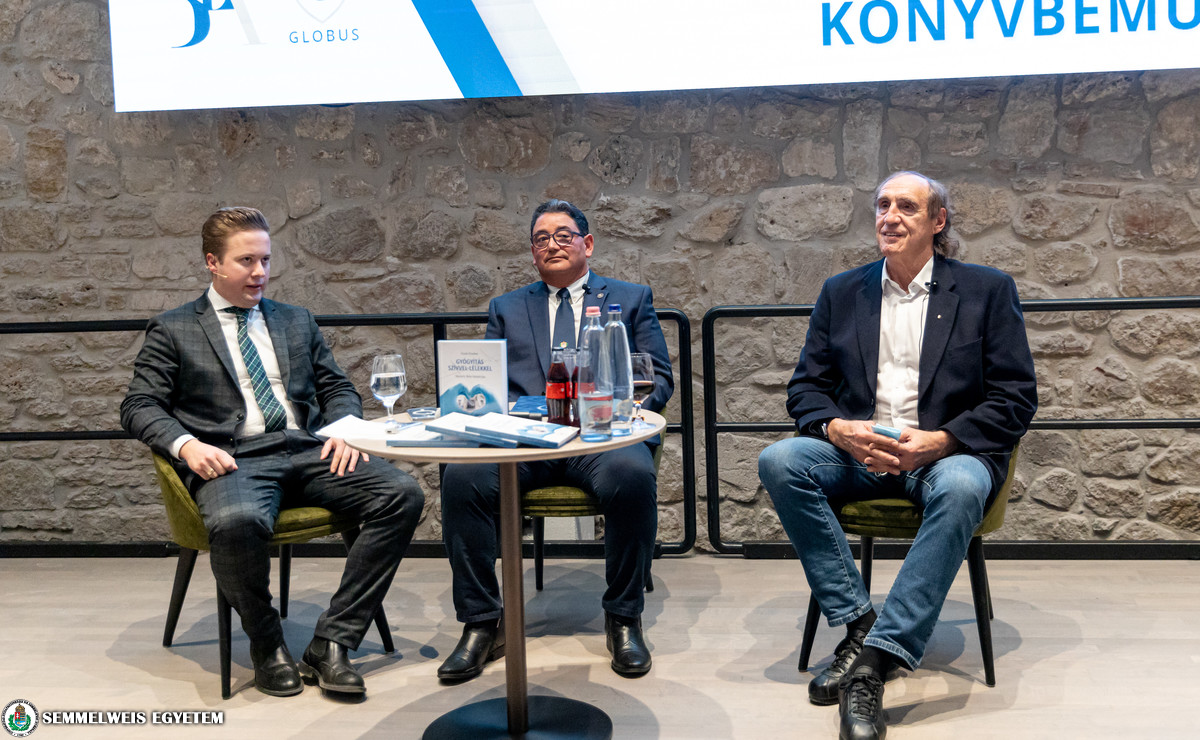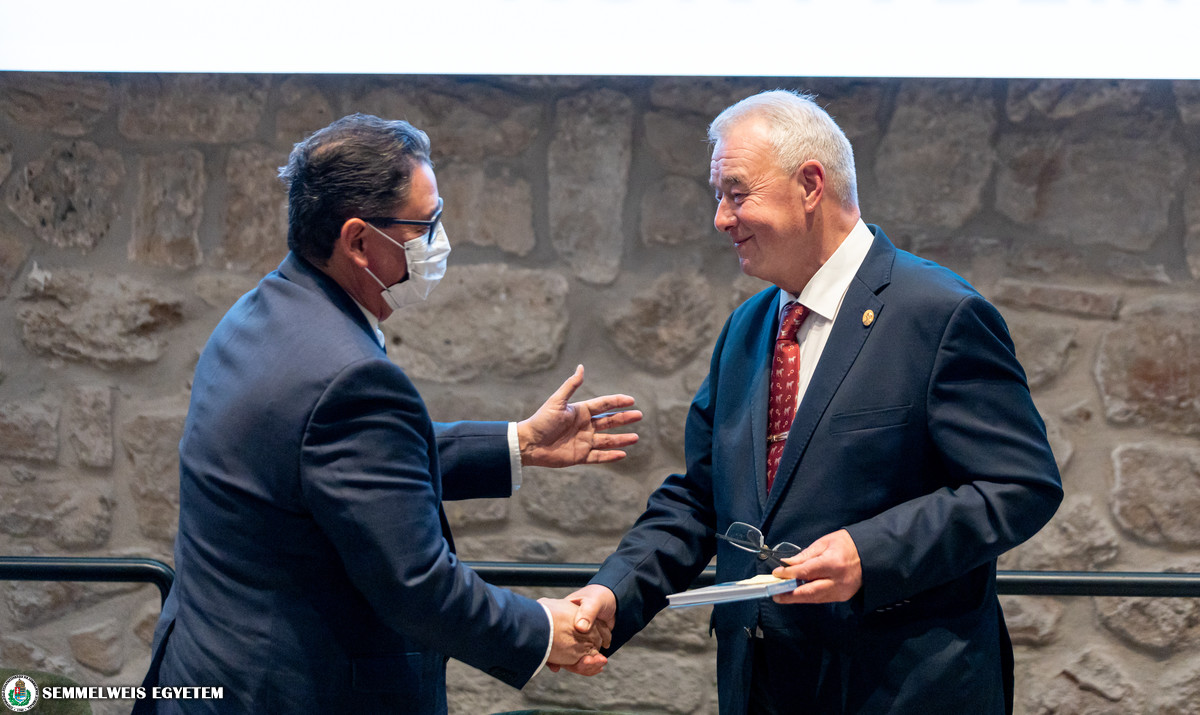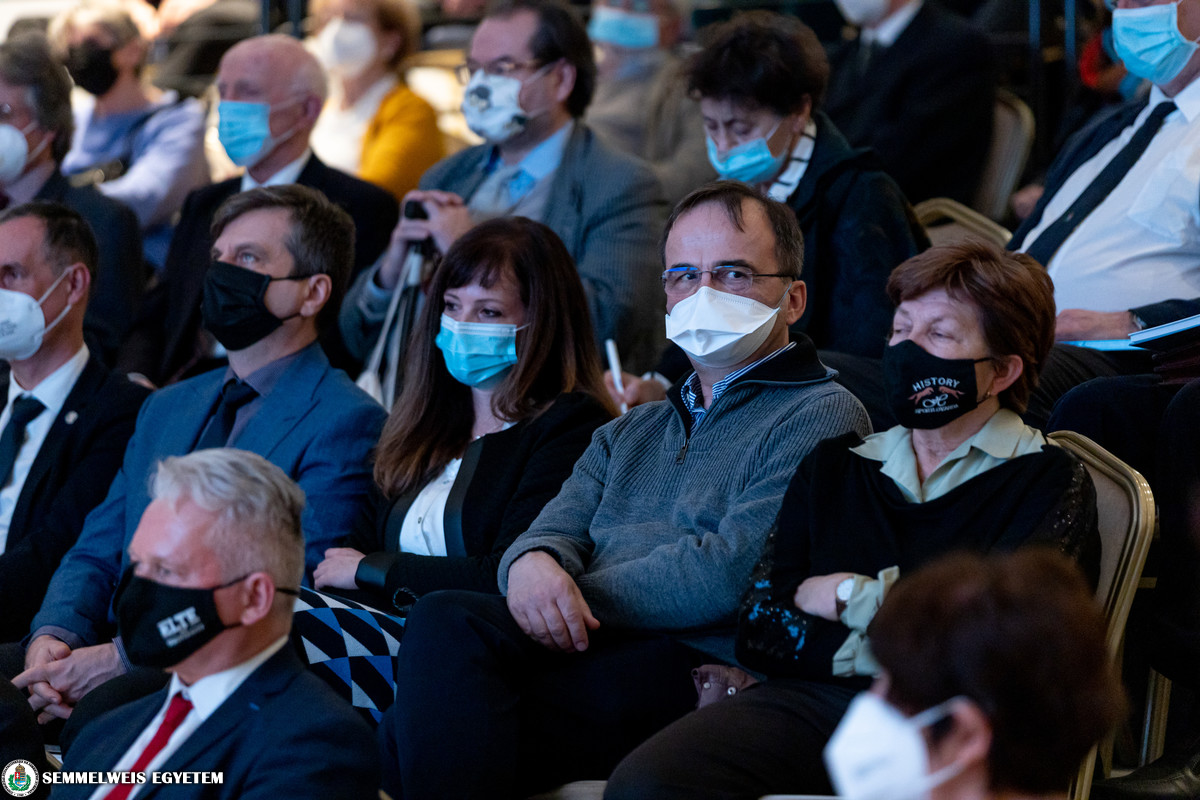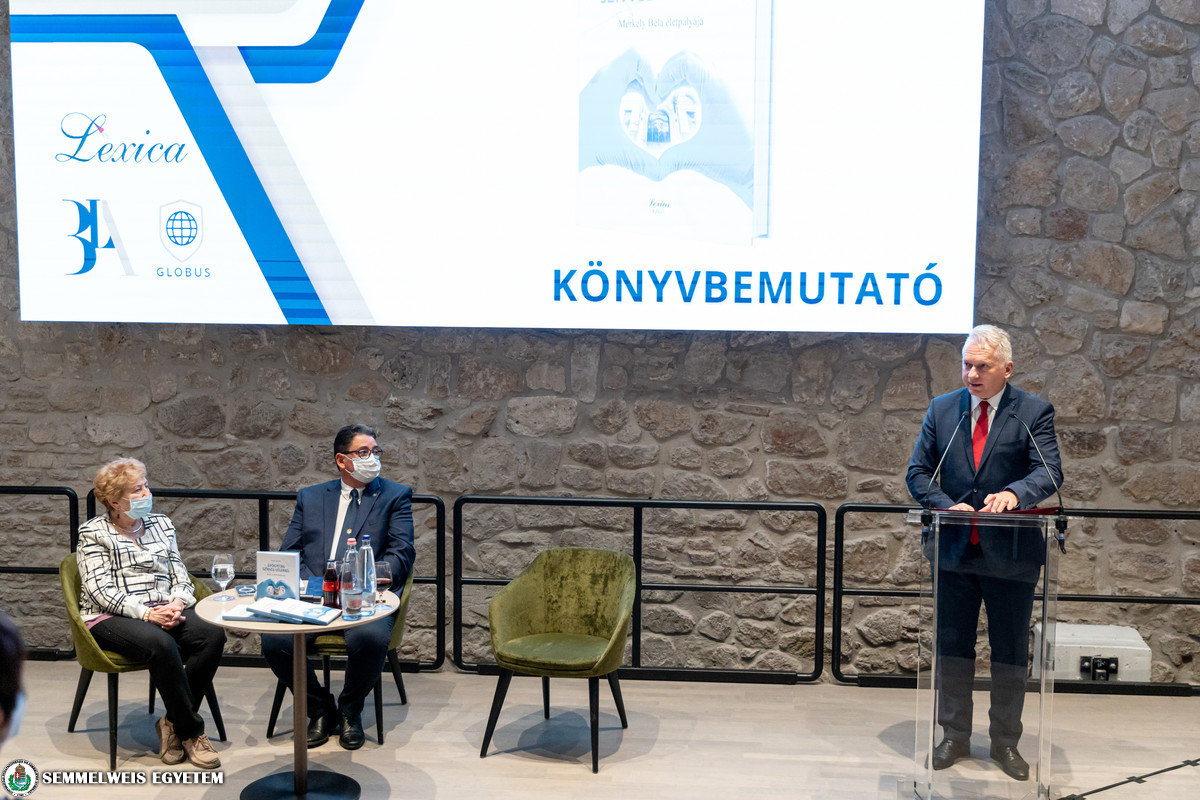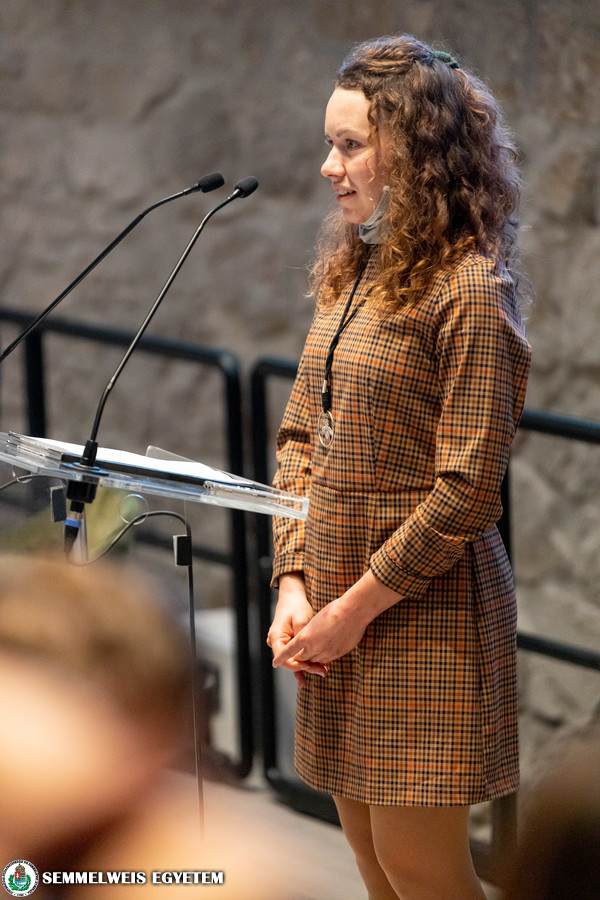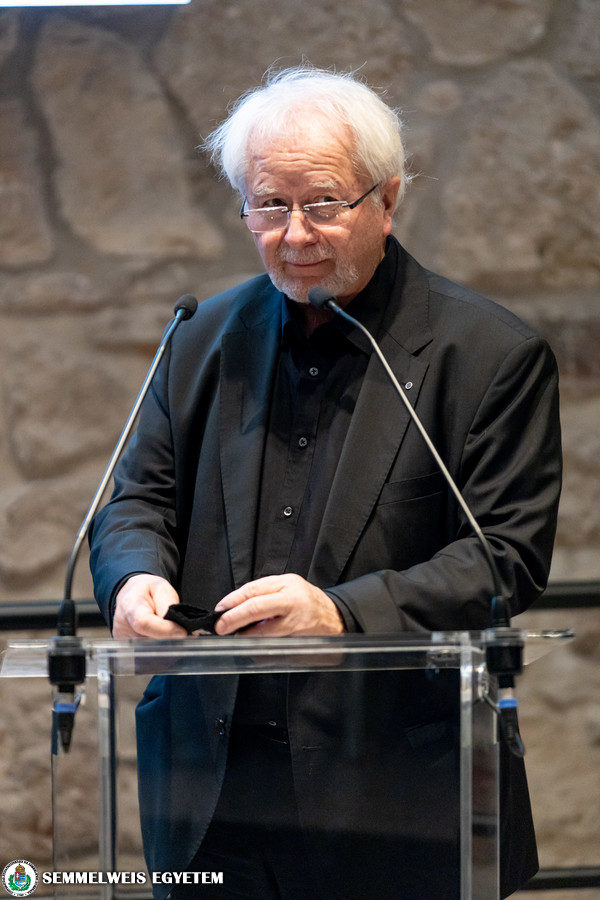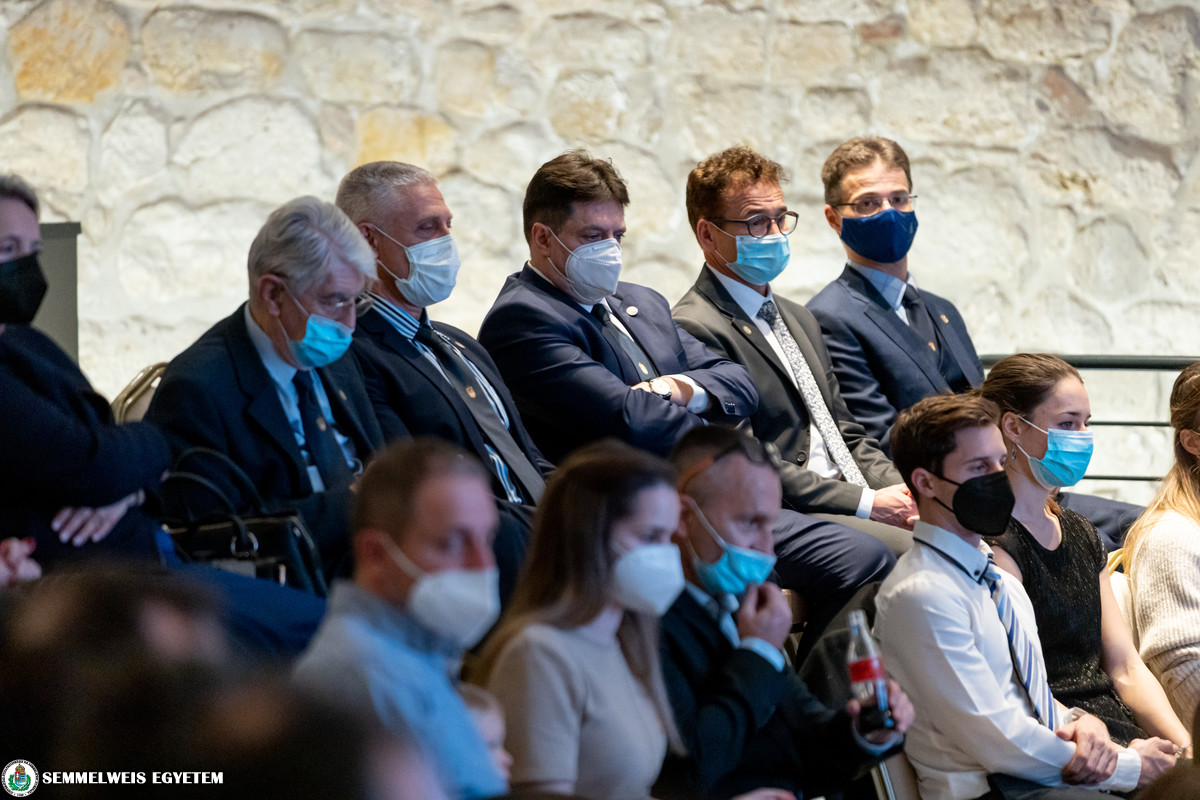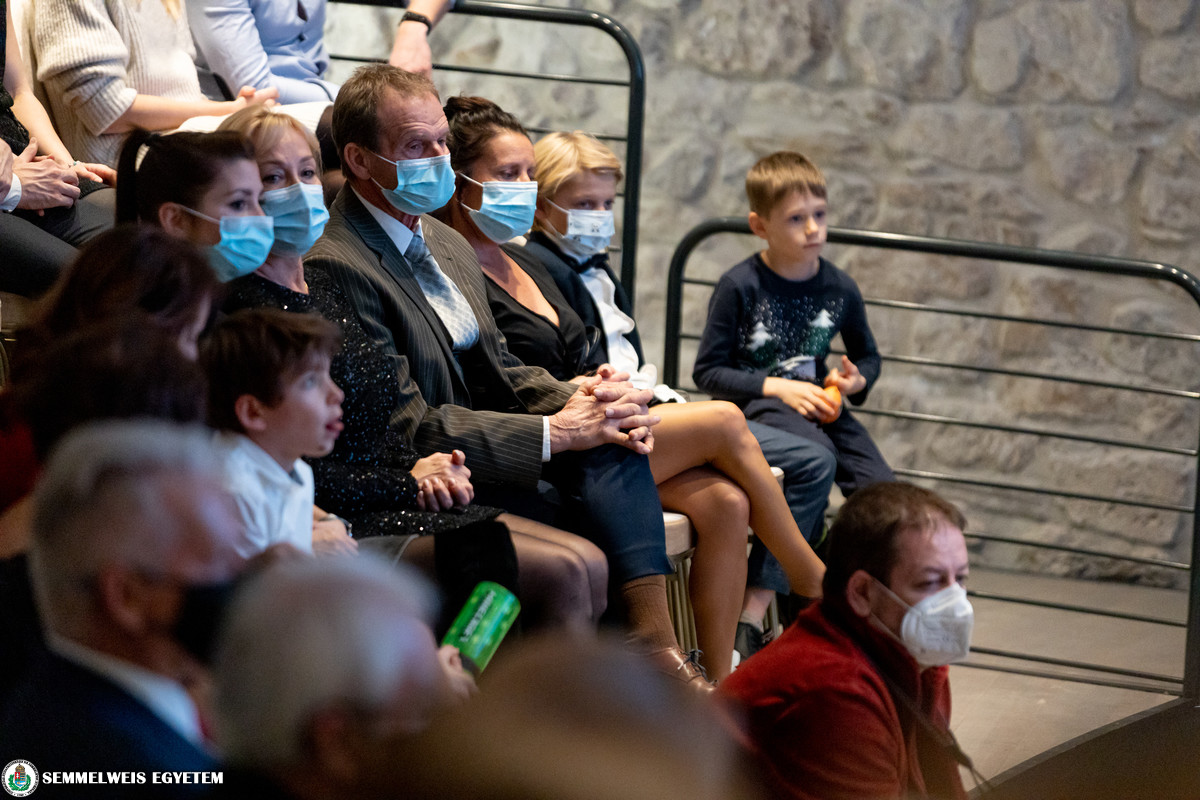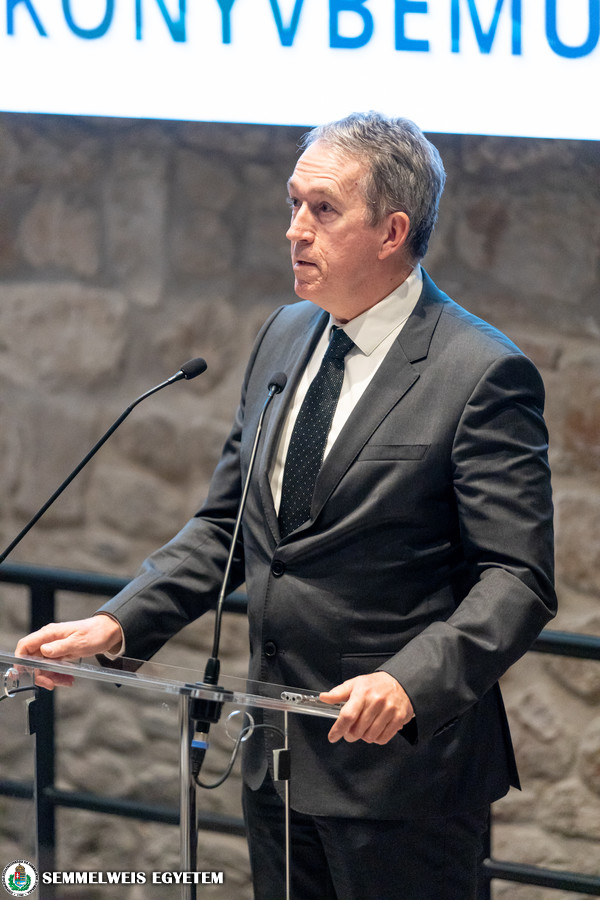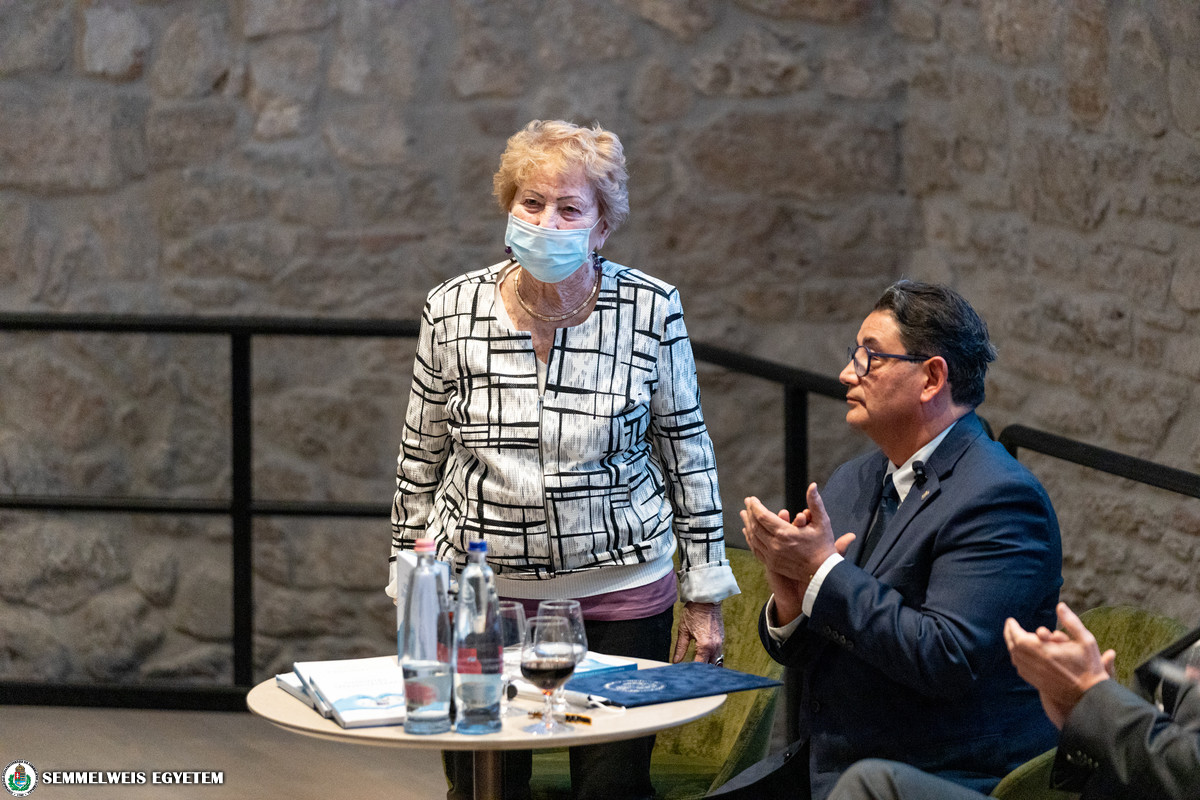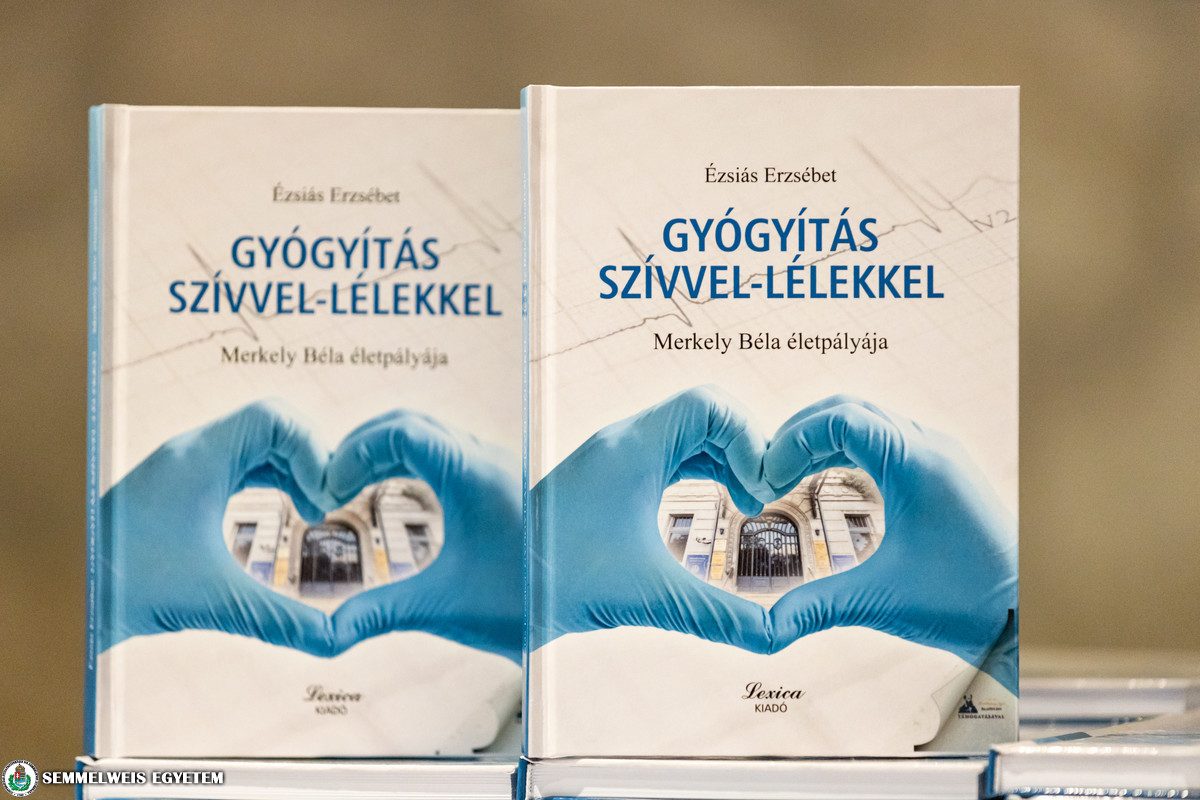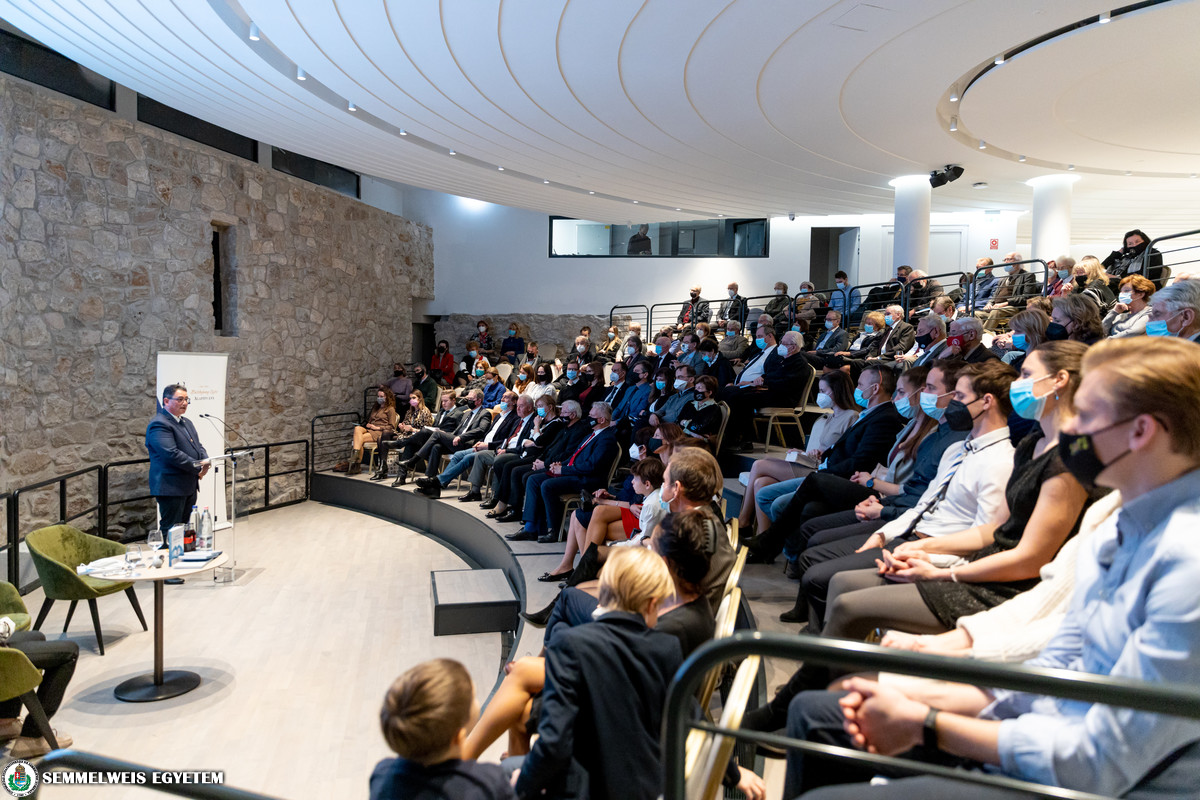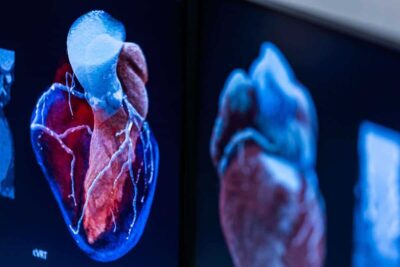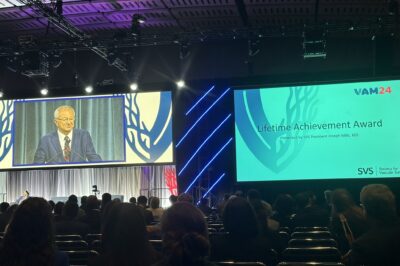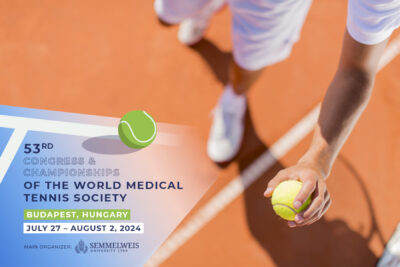The publication of the book was supported by the Lajos Batthyány Foundation, which was established by Prime Minister József Antall in 1991, so currently celebrating its 30th anniversary. Professor Tamás Dezső, President of the Foundation introduced the institution briefly in his welcome speech, then pointed out the fact that in the past two years of the epidemic, life sciences and medicine gained even more importance, playing a key role in the management and support of social behavior. He also thanked Dr. Béla Merkely and the entire Hungarian medical community for their heroic accomplishments.
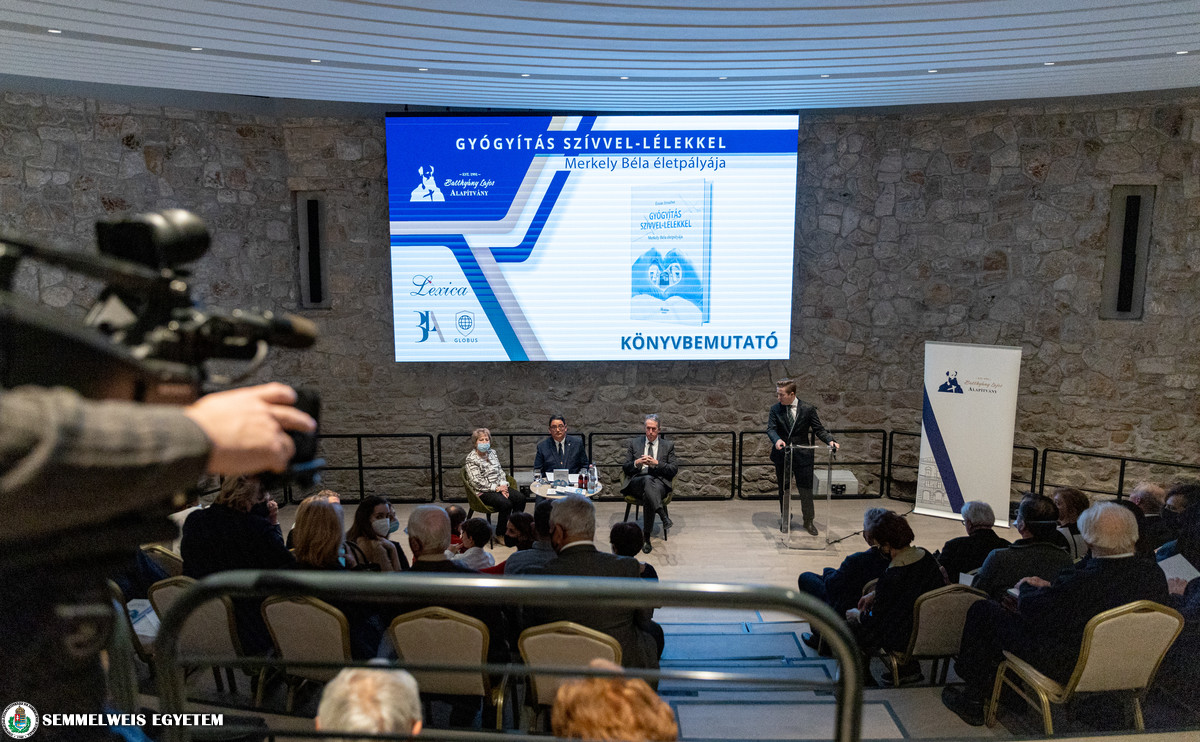 In the absence of Erzsébet Ézsiás, author of the book “Healing with Heart and Soul”, Lili Ratkovics interpreted her thoughts. According to the writer, conversations began with Dr. Béla Merkely in January 2021, during the second wave of the epidemic. At first, they took place at the Rector’s Office in Üllői Street, then at the Heart and Vascular Centre in Városmajor. The latter location is said to be the second home of the book’s main character, where the staff described him as a strict but fair and helpful leader. „The book portrays an interesting life and a large-scale professional career, through which readers can get to know a person who is dedicated to his profession and obsessed with cardiology; someone who pours his heart into his work, saving human lives,” the author said.
In the absence of Erzsébet Ézsiás, author of the book “Healing with Heart and Soul”, Lili Ratkovics interpreted her thoughts. According to the writer, conversations began with Dr. Béla Merkely in January 2021, during the second wave of the epidemic. At first, they took place at the Rector’s Office in Üllői Street, then at the Heart and Vascular Centre in Városmajor. The latter location is said to be the second home of the book’s main character, where the staff described him as a strict but fair and helpful leader. „The book portrays an interesting life and a large-scale professional career, through which readers can get to know a person who is dedicated to his profession and obsessed with cardiology; someone who pours his heart into his work, saving human lives,” the author said.
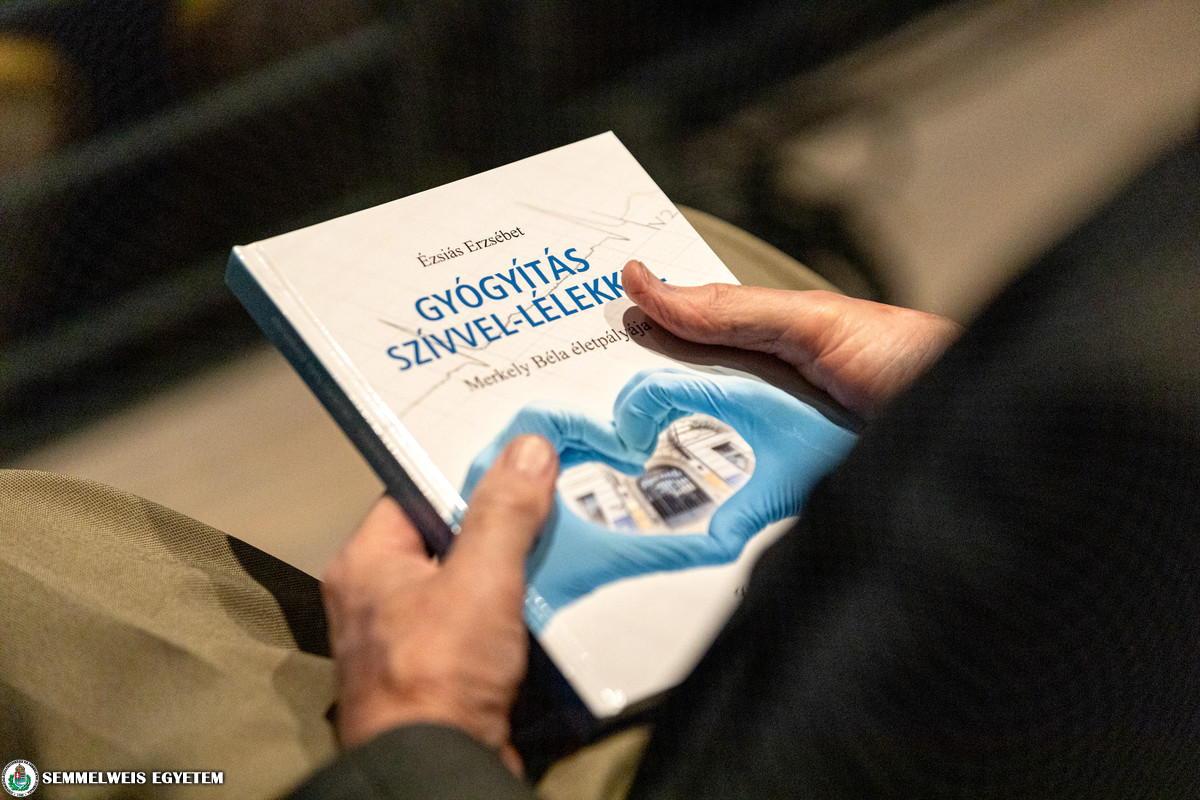 The book cover was designed by István Madarassy, a Kossuth Prize winner goldsmith and sculptor. In his speech, he highlighted that the book was the 10th volume published by Lexika Publishing House in the „Hungarian Scholars” series. During the design process, he sought to harmonize the content with the exterior. „That is why the focus was held on the beautiful wrought iron entrance of the Clinic in Városmajor, the protagonist’s second home; the gate is shown to be kept by his operating hand, with heart and soul,” said the artist, sharing an insight into the thought behind the cover.
The book cover was designed by István Madarassy, a Kossuth Prize winner goldsmith and sculptor. In his speech, he highlighted that the book was the 10th volume published by Lexika Publishing House in the „Hungarian Scholars” series. During the design process, he sought to harmonize the content with the exterior. „That is why the focus was held on the beautiful wrought iron entrance of the Clinic in Városmajor, the protagonist’s second home; the gate is shown to be kept by his operating hand, with heart and soul,” said the artist, sharing an insight into the thought behind the cover.
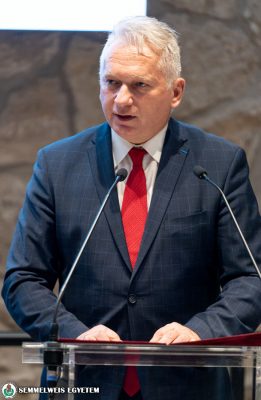 „Besides Dr. Béla Merkely’s career, this book represents the human side of a scholarly teacher, university leader and public figure, set in a unique environment as a valued member of the community”, said Dr. László Borhy, Rector of Eötvös Loránd University (ELTE). „Whoever reads the book, can find out what background it takes for someone to achieve such success,” he added in his laudation. Referring to the ancient traditions of commemoration, the Rector of ELTE spoke in detail about the origins of exhibiting a career in the form of a book, calling it a homage, a retrospection and also a model. He implied that reading the book, one gets to learn what could serve as an example for fresh graduates. „In case of Dr. Béla Merkely, family should be mentioned in the first place, but in addition to the motivation received from them, the place where he started his graduate studies, Semmelweis University itself is also very important; according to the book, he was admitted to the institution right away,” he said. Dr. László Borhy highlighted the Heidelberg period as well, which was an important scientific medium due to the inspiration received there. Finally, the Rector emphasized the fact that Dr. Merkely was able to pursue his career in one workplace – he entered the Clinic in Városmajor for the first time in 1991.
„Besides Dr. Béla Merkely’s career, this book represents the human side of a scholarly teacher, university leader and public figure, set in a unique environment as a valued member of the community”, said Dr. László Borhy, Rector of Eötvös Loránd University (ELTE). „Whoever reads the book, can find out what background it takes for someone to achieve such success,” he added in his laudation. Referring to the ancient traditions of commemoration, the Rector of ELTE spoke in detail about the origins of exhibiting a career in the form of a book, calling it a homage, a retrospection and also a model. He implied that reading the book, one gets to learn what could serve as an example for fresh graduates. „In case of Dr. Béla Merkely, family should be mentioned in the first place, but in addition to the motivation received from them, the place where he started his graduate studies, Semmelweis University itself is also very important; according to the book, he was admitted to the institution right away,” he said. Dr. László Borhy highlighted the Heidelberg period as well, which was an important scientific medium due to the inspiration received there. Finally, the Rector emphasized the fact that Dr. Merkely was able to pursue his career in one workplace – he entered the Clinic in Városmajor for the first time in 1991.
The respect for ancestors is reflected in the book as well, according to the rector. A portrait of his role model, Dr. Zoltán Szabó hangs on the wall of Béla Merkely’s office to this day, not to mention his tutor, Dr. Sándor Juhász-Nagy, who is also highly esteemed.
Dr. László Borhy reminded the audience that Dr. Béla Merkely was the 56th rector of Semmelweis University and the second in his family to hold such a position. His great predecessor, József Galántai Fodor, the first professor of public health was his great great grand uncle, who served as an exemplar in the fight against the epidemic, Dr. Borhy pointed out. The Rector of Eötvös Loránd University presented Dr. Béla Merkely with a commemorative medal of József Fodor from his own collection, issued by the Hungarian National Bank in the 1970s.
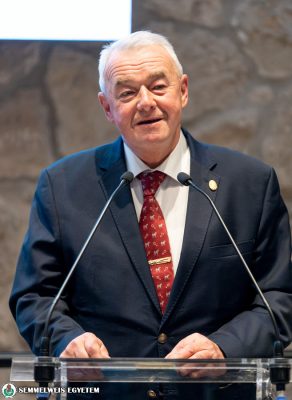 In his laudation, Dr. Péter Sótonyi, Rector of the University of Veterinary Medicine explained that he had met Dr. Béla Merkely 10 years ago, when he underwent a cardiac catheter surgery executed by him. „The Rector of Semmelweis University heals patients not only with heart and soul, but also with passion and the power of science, which helped him to build the Heart and Vascular Centre in Városmajor,” he pointed out. When Dr. Sótonyi was a patient at the Clinic, he himself witnessed that Dr. Béla Merkely visited the intensive care unit even on a Sunday evening. “It is fascinating to listen to him talking about his family, his past, not to mention his work pace and capacity. Even though he is a rector, he operates to this day, and adheres to the principle that medical training can only be real next to a sickbed – and well, this is the case, both professionally and from a human point of view. The book is a wonderful example of belonging, family, vocation, healing and people,” said Dr. Péter Sótonyi. He emphasized that Hungarian science, medicine and the nation’s population owed a lot to Dr. Béla Merkely, and that we should be grateful to him for leading the fight against the epidemic as well. „I am proud that in Hungary, he has been awarded an honorary doctorate for the first time at the University of Veterinary Medicine,” he added.
In his laudation, Dr. Péter Sótonyi, Rector of the University of Veterinary Medicine explained that he had met Dr. Béla Merkely 10 years ago, when he underwent a cardiac catheter surgery executed by him. „The Rector of Semmelweis University heals patients not only with heart and soul, but also with passion and the power of science, which helped him to build the Heart and Vascular Centre in Városmajor,” he pointed out. When Dr. Sótonyi was a patient at the Clinic, he himself witnessed that Dr. Béla Merkely visited the intensive care unit even on a Sunday evening. “It is fascinating to listen to him talking about his family, his past, not to mention his work pace and capacity. Even though he is a rector, he operates to this day, and adheres to the principle that medical training can only be real next to a sickbed – and well, this is the case, both professionally and from a human point of view. The book is a wonderful example of belonging, family, vocation, healing and people,” said Dr. Péter Sótonyi. He emphasized that Hungarian science, medicine and the nation’s population owed a lot to Dr. Béla Merkely, and that we should be grateful to him for leading the fight against the epidemic as well. „I am proud that in Hungary, he has been awarded an honorary doctorate for the first time at the University of Veterinary Medicine,” he added.
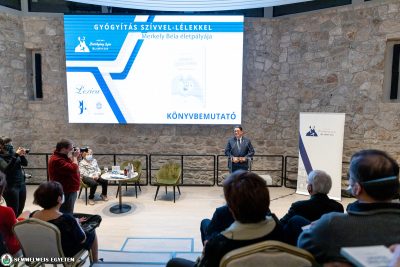 In his speech, Dr. Béla Merkely quoted Pope Francis saying, “Progress begins with a return to our roots.” What the Rector considers the most important message of the book is to have the right balance between retrospection and looking forward. Along this thought, he recalled the figure of his grandmother, who died at the age of 102, and was the main cohesive force of the family. He also spoke about the family home created by her great grandparents, which is still the place of farewell and return. He expressed his gratitude for the invitation to create this book, and for the persistent work of Erzsébet Ézsiás, emphasizing that the publication embodied a lasting memory of the roots that are important to him, and determined what kind of doctor and person he became. As he said, the advice of his grandfather, Dr. Keresztély Merkel defined the conversations with his patients and also the conduct of surgeries to this day. According to him, “If you are about to approach a patient, put yourself in comfort. Prepare yourself completely, turning all your attention to the cause!” He underlined that besides his grandfather and father-in-law, Dr. Géza Tasnádi, his great grand uncle, József Fodor also influenced him greatly. He was a pioneer of public health and epidemiology in Hungary and the former Rector of the University of Pest, whose memory was highly esteemed in the Merkely family since his childhood.
In his speech, Dr. Béla Merkely quoted Pope Francis saying, “Progress begins with a return to our roots.” What the Rector considers the most important message of the book is to have the right balance between retrospection and looking forward. Along this thought, he recalled the figure of his grandmother, who died at the age of 102, and was the main cohesive force of the family. He also spoke about the family home created by her great grandparents, which is still the place of farewell and return. He expressed his gratitude for the invitation to create this book, and for the persistent work of Erzsébet Ézsiás, emphasizing that the publication embodied a lasting memory of the roots that are important to him, and determined what kind of doctor and person he became. As he said, the advice of his grandfather, Dr. Keresztély Merkel defined the conversations with his patients and also the conduct of surgeries to this day. According to him, “If you are about to approach a patient, put yourself in comfort. Prepare yourself completely, turning all your attention to the cause!” He underlined that besides his grandfather and father-in-law, Dr. Géza Tasnádi, his great grand uncle, József Fodor also influenced him greatly. He was a pioneer of public health and epidemiology in Hungary and the former Rector of the University of Pest, whose memory was highly esteemed in the Merkely family since his childhood.
He also explained that in addition to his ancestors, he was very proud of his children. His daughter, Petra is currently working in a COVID department as a gynecologist; her older son, Gergő is researching orthopedics at Harvard University, and his younger son, Marci is in primary school at the moment, but will surely find his way in life, too. “We own the roots and wings from our grandparents and parents, therefore we were able to pass these on to the children,” he said.
According to him, sport has been a part of his life since he was 3 years old, and keeping fit is an essential part of his routine to this day. Besides his family, Dr. Béla Merkely is most proud of the Heart and Vascular Centre in Városmajor, which he considers to be his second home. By the time he entered the Clinic 30 years ago, only four cardiologists worked at the institution. „Since then, cardiology has evolved a lot; thankfully, these days we are able to implement the motto of the Mayo Clinic as well. Patients’ interests come first, their full recovery is paramount – and in order to achieve that, we have everything in our power,” he said. Dr. Merkely also remembered his most significant mentors, Dr. Zoltán Szabó and Dr. Sándor Juhász-Nagy.
Interview with Dr. Béla Merkely on the publication of „Healing with Heart and Soul”
What would you tell prospective readers, what is the most important message of the book?
Whenever we would like to get ahead, we need to look back first, and focus on our roots to see our foundations, our potential. Pope Francis, whom I quoted at the presentation of the book, put it this way: “Progress begins with a return to our roots.” Also, when we accomplish something, it’s worth looking back at those who helped us on the way, to become aware of who our mentors were, whom we have learned from, and how we can pass that on. An important aspiration of mine is to fill the ’work hub’ we have built at the Heart and Vascular Centre in Városmajor with a multitude of talented people – I believe that this will also have an impact on the future development of cardiology in Hungary.
The book represents your career so far – what else is on the horizon for you?
The Városmajor Clinic has developed a lot; I feel like it has reached its full potential, so our next goal is to develop Semmelweis University, to make it one of the top 100 universities in the world and to train the best doctors, dentists, pharmacists, and other healthcare professionals in Europe. Our opportunities are promising, but we have not yet come the way, and this is a way more complex mission than establishing a cutting edge clinic. We have solid foundations, but there is still a lot of work to do. It is essential to adapt the community mindset to a university level, that is, to make it common for anyone who becomes a doctor at the university to teach, research and heal at the same time. We want this to be the dominant approach in every discipline. The key to this is to develop workshops everywhere. If there is a mentor and a scientific work hub, the project will attract talented young people like a magnet.
How do you select the most talented medical students?
I asked this question once to my friend, Olympic champion water polo player Tamás Faragó. According to him, talented sportsmen are recognized by how they hold the “spoon” in their hand, meaning the ball itself. When a new medical student joins our team, I can measure his or her motivation by the initial conversation, but the professional future of a candidate can be assessed only after working together for at least a year or two. I usually focus on how enthusiastic, prudent and thorough that person is, even with a small task, and if there is any originality. I prefer them to think through the whole project, the process, and ultimately, strive for maximum results. It is in the best interest of the patient that we are not satisfied with 80 percent, but a minimum of 101 percent. That is a result acceptable without any reservations, because then there is one percent for negotiation.
At the end of the book presentation, a roundtable discussion took place with Dr. Béla Merkely and Dr. Tamás Faragó, the Olympic champion water polo player who wrote the preface of the book. According to Dr. Faragó, the sports community believes that if there is a medical problem, Dr. Béla Merkely is dependable at any moment. With his attitude and expertise, he had won at least one or two gold medals for Hungary, he said.
The book „Healing with Heart and Soul”, portraying the career of Dr. Béla Merkely, was published with the support of the Lajos Batthyány Foundation and the professional contribution of Lexika Publishing House.
Pálma Dobozi
Translation: Viktória Kiss
Photo: Attila Kovács – Semmelweis University
